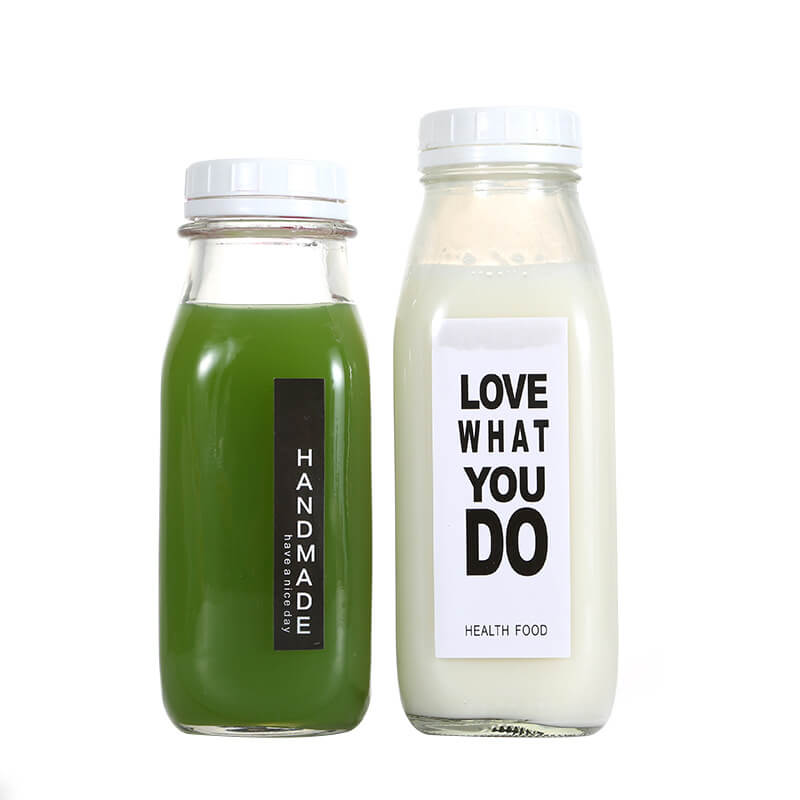For beverage manufacturers, it is not easy to choose a beverage bottle suitable for their own brands, because beverage bottles have various shapes, sizes, colors and different materials.
Glass bottles

Glass bottles have been the popular choice of beverages for centuries because of their durability, transparency and the ability to maintain the taste and quality of beverages. Glass bottles are usually used for high-grade drinks, such as fine wine, Baijiu and craft beer, because they provide an airtight seal to keep the drinks fresh and prevent oxidation. Glass bottles are also recyclable and environmentally friendly, making them a popular choice for companies wishing to reduce their carbon footprint. When enterprises want to have a beautiful appearance and give people a cool touch, glass bottles are the preferred packaging.
Material of glass bottle

Glass products are made of more than ten kinds of raw materials, such as broken glass, soda ash, sodium nitrate, barium carbonate, quartz sand, etc., and are made by melting and shaping at 1600 ℃. They can produce glass bottles of different shapes according to different molds, mainly including various wine bottles, beverage bottles, pickle bottles, honey bottles, can bottles, soda bottles, carbonated beverage bottles, coffee bottles, tea cups

Production process of glass bottles
The glass bottle production process mainly includes:
① raw material pre-processing. Crush the bulk raw materials (quartz sand, soda ash, limestone, feldspar, etc.), dry the wet raw materials, and remove iron from the iron-containing raw materials to ensure the glass quality.
② Batch preparation.
③ Melting. The glass batch is heated at high temperature (1550~1600 ℃) in the tank furnace or tank furnace to form a uniform, bubble-free liquid glass that meets the molding requirements.
④ forming. Put the liquid glass into the mold to make the required shape of glass products, such as flat plates, various utensils, etc.
⑤ Heat treatment. Through annealing, quenching and other processes, the stress, phase separation or crystallization in the glass can be eliminated or produced, and the structural state of the glass can be changed.

Advantages of glass packaging containers in the field of beverage packaging
Glass packaging materials and containers have many advantages:
1. Glass materials have good barrier performance, which can well prevent the invasion of oxygen and other gases on the contents, and can prevent the volatile components of the contents from volatilizing into the atmosphere.
2. The glass bottle can be used repeatedly, which can reduce the packaging cost.
3. Glass can easily change color and transparency.
4. The glass bottle is safe and sanitary, has good corrosion resistance and acid corrosion resistance, and is suitable for packaging acidic substances (such as vegetable juice drinks, etc.
There are many kinds of glass bottles, ranging from small bottles with a capacity of 1ML to large bottles with a capacity of more than ten liters, from round, square, to special-shaped bottles with handles, from colorless and transparent amber, green, blue, black opaque bottles, and opaque opaque glass bottles. In terms of manufacturing technology, glass bottles are generally divided into two categories: molded bottles (using model bottles) and tube bottles (using glass tube bottles). Molded bottles are also divided into large-mouth bottles (with a diameter of more than 30MM) and small-mouth bottles. The former is used to hold powdery, blocky and creamy articles, and the latter is used to hold liquid. According to the form of bottle mouth, it can be divided into cork bottle mouth, screw bottle mouth, cap bottle mouth, roller bottle mouth, frosted bottle mouth, etc. According to the usage, it can be divided into “disposable bottles” that are discarded once and “recycled bottles’ ‘ that are used repeatedly. According to the classification of contents, it can be divided into wine bottles, beverage bottles, oil bottles, can bottles, acid bottles, medicine bottles, reagent bottles, infusion bottles, cosmetics bottles, etc.
Wine glass bottles

Juice glass bottles

Cosmetic glass bottles

Pharmaceutical glass bottles

Conclusion
In conclusion, there are a variety of beverage bottles to choose from, each with its own unique features and benefits. Whether you are looking for a durable and recyclable option, or a convenient and portable solution, there is a beverage bottle that is perfect for your needs. Whether you are a manufacturer, a distributor, or a consumer, it is important to consider the environmental impact of your beverage choices, and choose a bottle that is both functional and sustainable.


